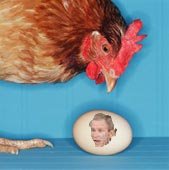Saturday, March 18, 2006
Worse than Watergate, 3: the Chickens and Eggs of Arrogance and Incompetence
 According to John Dean, the Bush Administration was given extensive briefings on the threat that Al Qaeda posed to the nation. During a transition meeting December 19, 2000, Bill Clinton told Bush that his biggest national security problems would come from Bin Laden and Al Qaeda. Clinton's national security adviser, Sandy Berger, set up 10 security briefings for Condoleeza Rice.
According to John Dean, the Bush Administration was given extensive briefings on the threat that Al Qaeda posed to the nation. During a transition meeting December 19, 2000, Bill Clinton told Bush that his biggest national security problems would come from Bin Laden and Al Qaeda. Clinton's national security adviser, Sandy Berger, set up 10 security briefings for Condoleeza Rice.After the inauguration, Bush and Cheney received the bipartisan report commissioned by Clinton's Defense Secretary, William Cohen, of a multiyear study of national security problems likely to confront the nation. Chaired by two former senators familiar with military and national security issues, Warren Rudman and Gary Hart, the report, released Jan. 31, 2001, urged the administration to focus on terrorism as its first priority.
Cheney told Bush to turn the project over to him and closed down the Rudman-Hart Commission. In May of 2001 Bush told the nation, "Some non-state terrorist troups have. . . demonstrated an interest in acquiring weapons of mass destruction. . . It is clear that the threat of chemical, biological, or nuclear weapons being used against the United States --while not immediate-- is very real." Cheney's recommendations were to create an Office of National Preparedness in FEMA, a move that killed the Rudman-Hart commission's recommendation to create a homeland security department with cabinet rank (a plan that the White House claimed as its own after 9/11.) The Bush Administration, allergic to all ideas emanating from the Clinton Administration, had blown off its most urgent counsel.
Once 9/11 became part of U.S. history, the need to analyze what and how it had happened came back to haunt the Bush Administration. With Democrats then in control of the Senate, the White House, realizing that it could exert only partial over Congress, attempted to work only with House and Senate intelligence committees, whose meetings and records were generally kept secret. Cheney told then Senate Majority Leader Tom Daschle that "a review of what happened on September 11 would take resources and personnel away from the effort in the war on terrorism." Cheney finessed the combining of the House and Senate committees, knowing that an overloaded group would function less effectively, reducing the time for questioning witnesses and depleting staff support. Since all the information needed was controlled by the White House, the administration was in a position to pick and choose what information it would release to the committee.
The intent of the Bush Administration became even clearer when it refused to allow Defense Secretary Donald Rumsfeld or Secretary of State Colin Powell to testify on matters relating to pre-9/11 counterterrorism activities.
Only the pressure from the families of the victims of 9/11 pushed the inquiry onto center stage, and again in the face of resistance from Bush-Cheney. They relented when they secured the power to pick the commission chair, first Henry Kissinger, who resigned with conflicts of interest, and then former New Jersey Governor Thomas Kean, who had no experience with national security. Through him they were further able to pack the staff with White House favorites in order to control the focus of the commission.
Once formed, according to Dean, the commission had to deal regularly with the distractions of White House stalling and negotiating, further blurring its focus. Given a little room in the White House to perform its tasks, commission members were not allowed to take even their notes home with them in order to review them.
By increasing the wear and tear on members of the commission, the administration would be able to maintain its distance from blame. By forcing the bipartisan committee to put its energy into the "roots" of terrorism, it could shift the blame to the Clinton Administration.
Clearly, it wasn't going to credit Clinton with sounding the first warning note.
Next: the cover of terror
Comments:
<< Home
Bring up terrorism during the Clinton administration and the neo-cons start chanting, The Cole, The Cole.
Anyone from the right (like Dean) who has stepped forward to express disdain for these BushCo crooks has been branded unpatriotic, crazy or disgruntled.
Karl Rove is an evil genius at this game. May he rot in Hell.
Anyone from the right (like Dean) who has stepped forward to express disdain for these BushCo crooks has been branded unpatriotic, crazy or disgruntled.
Karl Rove is an evil genius at this game. May he rot in Hell.
That's why it's good to counter with facts, especially since Clinton learned something from the Cole... enough to commission a study on terror past and future.
We'll all just have to live with the unpatriotic label while we work to remind each other what true patriotism is.
Post a Comment
We'll all just have to live with the unpatriotic label while we work to remind each other what true patriotism is.
<< Home



